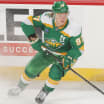She wanted the moves fresh in her mind. So on wintry Saturday nights, Danielle Goyette would grab her skates, slip out and walk to the rink one house away from her own, her brain bursting with what she had just watched on television.
She had gotten lucky, really, being the second youngest of the eight kids in her family. Because on Saturday nights her older sisters would head out, leaving Goyette to claim the TV, her lifeline to the Montreal Canadiens and all they could teach her.
Goyette reached Hall of Fame against odds
Self-made player overcame language barrier to star for Canada in Olympics
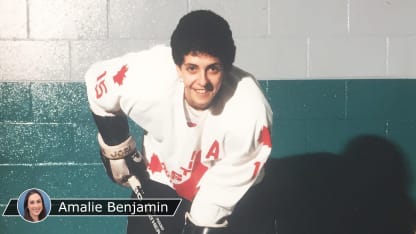
For her sisters, Saturdays were for socializing. For Goyette, Saturdays were sacred. For a girl with no coach, no training, no formal hockey education, the television was her master class, giving her the chance to see players performing at the highest level and then to rush out and mimic what they did.
Goyette would place snowballs on the ice, pretending they were the defensemen who had tried to stymie
Guy Lafleur
in the game that night. They were the defensemen who would try to stand in her way, too, as she attempted to find their moves on her skates.
"We put boards together just before the snow came and we'd wait for the snow," said Goyette, 51. "I don't know if somebody shoveled that rink more than I did when I was young. You have no choice: If you want to play, you have to shovel.
"Being from a big family, I think the sport allowed me to be outside of all the people yelling at each other, the kids fighting in the house. For me, the sport allowed me to be me, to be myself on the ice. I could have any kind of problem and when I step on the ice, everything stops."
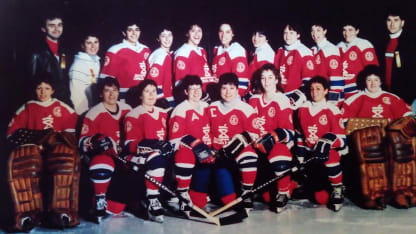
\\\\
None of this was supposed to happen. She was not supposed to go from little girl out on the rink on those Saturday nights in the tiny rural town of Saint-Nazaire, Quebec, to unimaginable heights. She was not supposed to make the Olympic team, and make it again, and again.
She was certainly not supposed to make the Hockey Hall of Fame, which will happen on Nov. 13 when she becomes the fifth woman to earn induction.
Goyette probably wouldn't have had she not taken it upon herself to move to Calgary in 1996 to learn English, packing up her little white Mazda and hitting the road. She had always been a dedicated hockey player, but until then she had yet to commit fully to the fitness and the training and the language skills, had yet to immerse herself.
In 1996, it was time, with the 1998 Nagano Olympics, the first to include women's hockey, beckoning. At age 30, she picked up and left Quebec, striking out on her own in Alberta, a province she had never visited and where they spoke a language she did not know.
It was not easy. She had not expected it to be.
"It just was such a fatiguing factor of every day, and then you add the physical training on top of that and being in a new place and everything else," said Stacey Wilson, the captain of Canada's 1998 Olympic team and Goyette's roommate in Calgary, where the player pool for Nagano gathered in August 1997. "There was certainly frustration that was beyond anything anyone else was going to feel because we were in our first language.
"But she just kept going, kept taking the frustration, taking the fatigue and pushing through."
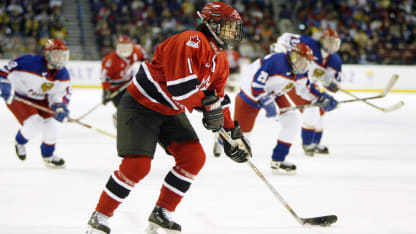
For the five years before that, she had been on the national team, unable to fully interact, unable to understand. Coming from a French-speaking family, she had never needed English before. Now she did.
"I don't think I would have went through all that if I was not passionate about that game because it would have been too hard," Goyette said. "You train, you're physically exhausted, but mentally you're exhausted because you can't understand what's going on all day."
She had to find a job in Calgary, with no English, and ended up working at the Olympic Oval cleaning dressing rooms, bathrooms, toilets. She would train in the mornings, from 7-8 a.m., go home to nap, return for training from noon-3 p.m., followed by work from 4-11 p.m., five days a week.
"She had a lot of obstacles, more than most people, I would think," said Roanne Levitt, a friend of 30-plus years and former teammate. "She would never cut corners -- anything a coach or trainer would ask her to do, it didn't matter how painful or uncomfortable, how sick it made her."
She would do anything and everything, including joining the plumbing department at The Home Depot after Nagano as part of their Olympic program, in which athletes were paid full-time wages for part-time work, allowing them to devote more hours to training. She was, unsurprisingly, the only woman in plumbing.
"I think she's a living example of no excuses, of someone who moved across the country, didn't speak a word of English, worked a part-time job, went after her dream, didn't complain about it," said Hayley Wickenheiser, who played with Goyette on the Canadian Olympic team and for her at the University of Calgary, where Goyette coaches and where she won a national championship in 2012. "It's an example to all young players that there's no excuses why you can't do the same. Money was an issue, language was an issue, everything was an issue for her, and she somehow worked to overcome it."
Goyette said, "It's funny. I didn't think I could make it five months, and it's been 21 years."
\\\\
Calgary made all the difference. Suddenly she had coaches and training and support. She started to understand the words those coaches were saying, liberated from her time standing at the back of the line in drills to see what elicited praise, and what drew criticism. She started to learn.
"I just played with read and react," Goyette said. "I didn't know systems. All the players on the national team didn't want to play with me because I didn't know all the X and O. ... I didn't grow up with coaches teaching me how to play the game. I'd just watch on TV and try to skate what I saw the game before."
For a long time, that was enough.
"She's such a naturally gifted and skilled athlete, not even just a hockey player," Wickenheiser said. "She could have picked up a baseball bat or a tennis racket and probably have done the same thing. Her athletic ability and her athletic IQ are really high."
Goyette was all offense, imaginative and tenacious. As she said, "I was a way more offensive player because I never learned the defensive part of the game until I was in my 30s."
Wickenheiser said: "She was a perceptual player, which the greatest players all are. Nobody is a great player by thinking the game, ever. ... Not always an easy player to play with because you kind of needed to blend that skill. That's very similar to what you see with a lot of star players -- they're not always easy to play with because they're always that much further ahead of the game."
Goyette played in three Olympics (winning two gold medals) and nine Women's World Championships (winning eight), finishing up in 2007 at age 41. She ended her career second all-time in Olympic history with 15 goals, and fourth in World Championship history with 68 points (37 goals). She considered continuing on, trying to make it to the 2010 Vancouver Olympics, but the opportunity to coach the University of Calgary had come up and, well, it was time.
"I would consider her iconic, not only with her talent and her sheer ability to play the game at the highest level," Wilson said. "Also in her longevity -- she still was one of the best players in the world when she retired."
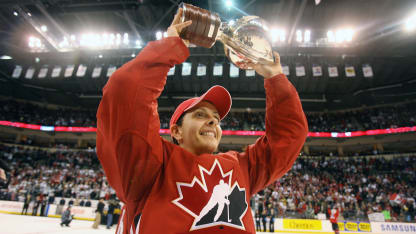
© Christopher Pike/Getty Images
\\\\
When Goyette first considered the move to Calgary, she talked about it with her brother, telling him she was going to train for the Olympics, going to see what hockey could give her and what she could give hockey.
"You'll never go to the Olympics," he said, as she recalls.
Her response was to place a bet -- $500 that she would earn a spot. Five hundred dollars for a dream.
She is here, now, nearly two decades after going to Nagano, 11 years after serving as the flag-bearer for Canada in the 2006 Torino Olympics, on the doorstep of the Hall of Fame. She is a lifetime away from the girl with no English and no conception of hockey immortality, with only a love and a rink and a team full of hockey players to emulate as best she could.
She has done it all, everything she could have imagined and so much more she never did.
That $500, though? She's still waiting to collect.














